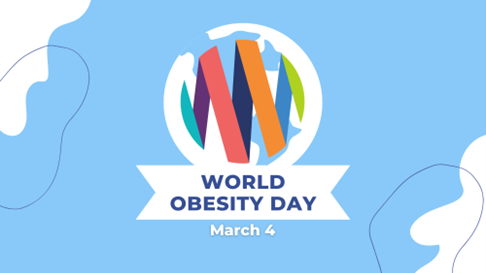Shaping a Healthier Future: World Obesity Day 2024
March 3, 2024
By: McKenzie Chapman
Categories: Blog Posts, Weight Loss
Why World Obesity Day Matters
World Obesity day is recognized on March 4 every year and is a great way to spread awareness and advocate for change. Each year, World Obesity Day focuses on a specific theme. The theme for 2024 is "Let's Talk About Obesity And...". This year’s goal is to use World Obesity Day as a platform to initiate broader discussions. By examining health, youth, and our surroundings, it aims to explore collaborative approaches to addressing obesity.
World Obesity Day is organized by the World Obesity Federation in partnership with its worldwide members, such as the United Nations International Children's Emergency Fund (UNICEF) and the World Health Organization (WHO). World Obesity Day challenges us as a society to raise awareness about the root causes of obesity, enhance understanding of the disease, combat weight stigma, amplify the voices of individuals with lived experiences, and promote actions to improve global understanding, prevention, and treatment of obesity.
What is Obesity?
Obesity is a condition that affects multiple body systems, including the heart, liver, kidneys, joints, and reproductive system. It can result in various noncommunicable diseases (NCDs), such as type 2 diabetes, cardiovascular disease, hypertension, stroke, various cancers, and mental health disorders. Obesity is complex and sometimes requires more than lifestyle changes to prevent and combat effects of the condition.
Typically, the biggest risk factors for obesity include physical inactivity, unhealthy eating habits, insufficient sleep, and stress. These risk factors are able to be modified usually through lifestyle changes. However, what makes obesity so complex is the risk factors that are unchangeable, such as certain health conditions and genetics. Additionally, social inequality factors such as lack of access to healthy foods and low income levels in communities play a role in the disease.
What can you do to make a change?
Take care of yourself! It is important to understand risk factors specific to you and your body. Know your medical conditions and history, find healthy foods that you like, engage in physical activity, get enough sleep, and manage your stress. Visit the World Obesity Website to learn more about obesity and how you can contribute to discussions and initiatives to improve health outcomes associated with obesity.
St. Mary’s Offers Wellness Centers and Nutrition Services
St. Mary’s offers Wellness Centers in Athens and Lavonia! Our centers feature a range of cardiovascular and strength-training equipment, along with knowledgeable and friendly staff. Join us for fun fitness classes suitable for all levels. To learn more, visit the St Mary's Athens wellness center, or our Lavonia wellness center!
St. Mary’s Nutrition Services provides a staff of registered dietitians to help patients with a wide range of conditions and needs meet their nutritional requirements.
Clinical Nutrition Services include:
- Individual nutrition assessment and counseling for all age groups
- Individualized meal plans and disease self-management strategies
- Nutrient analysis
- Assessment of calorie needs; individualized weight management plans
- Assistance with diabetes self-management classes and counseling
If you have more questions, you can always contact St. Mary's Outpatient Nutrition Services at (706) 389-3669 or click here.
St. Mary’s Bariatric Surgery program can help. Bariatric surgery – also known as weight loss surgery is one of the many tools available to help people lose weight and live healthier lives. In combination with diet, exercise, and behavior modification, bariatric surgery helps to achieve lasting weight loss. Learn more about our classes, support groups and surgical options.
